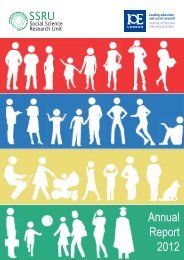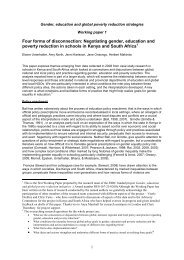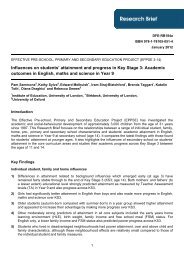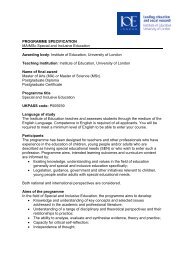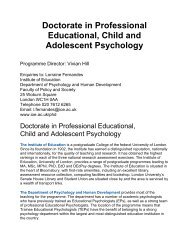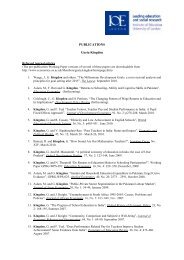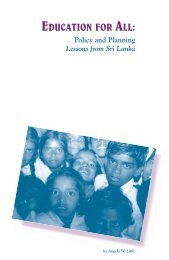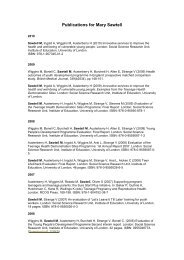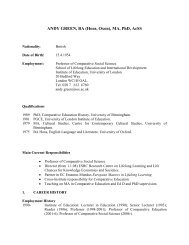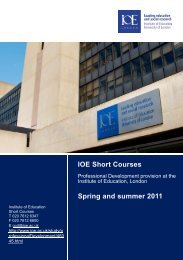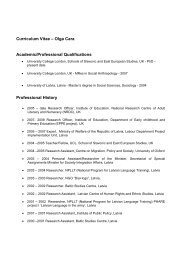Andy Green's Full Bibliography and Reviews of his Books.
Andy Green's Full Bibliography and Reviews of his Books.
Andy Green's Full Bibliography and Reviews of his Books.
You also want an ePaper? Increase the reach of your titles
YUMPU automatically turns print PDFs into web optimized ePapers that Google loves.
<strong>Andy</strong> Green’s <strong>Full</strong> <strong>Bibliography</strong> <strong>and</strong> <strong>Reviews</strong> <strong>of</strong> <strong>his</strong> <strong>Books</strong>.<br />
PUBLICATIONS<br />
Authored <strong>Books</strong> <strong>and</strong> Monographs<br />
Green, A. Mostafa, T. <strong>and</strong> Preston, J. (2010) The Chimera <strong>of</strong> Competitiveness:<br />
Varieties <strong>of</strong> Capitalism <strong>and</strong> the Economic Crisis, LLAKES Research Paper.<br />
Institute <strong>of</strong> Education, London.<br />
Green, A., Janmaat, G. <strong>and</strong> Han, C. (2009) Regimes <strong>of</strong> Social Cohesion, LLAKES<br />
Research Paper 1. Institute <strong>of</strong> Education, London.<br />
Green, A. Little, A., Kamat, S., Oketch, M. <strong>and</strong> Vickers, E. (2007) Education <strong>and</strong><br />
Development in a Global Era: Strategies for ‘Successful’ Globalisation, DFID.<br />
Green, A., Preston, J. <strong>and</strong> Janmaat, G. (2006) Education, Equality <strong>and</strong> Social<br />
Cohesion, Palgrave. (240 pages)<br />
Green, A., Oketch, M. <strong>and</strong> Preston, J. (2006) Participation in Formal Technical <strong>and</strong><br />
Vocational Education Programs Worldwide: An Initial Statistical Study,<br />
UNEVO, UNESCO Institute for Statistics, Montreal.<br />
Brown, P, Green, A. <strong>and</strong> Lauder, H. (2001) High Skills: Globalization,<br />
Competitiveness <strong>and</strong> Skills Formation, Oxford University Press (306 pages).<br />
Schuller, T. et al (2001) Modelling <strong>and</strong> Measuring the Wider Benefits <strong>of</strong> Learning,<br />
Institute <strong>of</strong> Education (84 pages).<br />
Green, A., Wolf, A. <strong>and</strong> Leney, T. (1999) Convergence <strong>and</strong> Divergence in<br />
European Education <strong>and</strong> Training Systems, Institute <strong>of</strong> Education (296 pages).<br />
(Spanish edition: Convergnecias Y Divergencias en los Sistemas Europeos de<br />
Educacion y Formation Pr<strong>of</strong>essionel (2001), trans J. Pomares, Ediciones<br />
Pomares, Barcelona).<br />
Green, A., Hodgson, A. <strong>and</strong> Williams, G. (2000) Where are the Resources for<br />
Lifelong Learning? OECD (137 pages).<br />
Green, A. (1997) Education, Globalization <strong>and</strong> the Nation State, Macmillan (206<br />
pages).
(Japanese translation by N. Ota, Tokyo Metropolitan University Press, 1999;<br />
Chinese translation by Zhu Xudong, Education Science publishing, Beijing,<br />
2003).<br />
Hill, D. et al (1991) Changing the Future, Tufnell Press (183 pages).<br />
Green, A., (1990) Education <strong>and</strong> State Formation. The Rise <strong>of</strong> Education Systems<br />
in Engl<strong>and</strong>, France <strong>and</strong> the USA, Macmillan (353 pp).<br />
(Chinese translation by Zhu Xudong, Education Science publishing, Beijing,<br />
2004; forthcoming in Japanese trans. Miyakoshi) .<br />
Education Group 11 (1991) Education Limited: Schooling <strong>and</strong> Training <strong>and</strong> the<br />
New Right Since 1979, University <strong>of</strong> Birmingham Department <strong>of</strong> Cultural Studies,<br />
Unwin Hyman, (340 pp).<br />
Edited <strong>Books</strong><br />
Green, A. <strong>and</strong> Lucas, N. (eds) (1999) Further Education <strong>and</strong> Lifelong Learning:<br />
Realigning the Sector for the 21 st Century, IOE (238 pages).<br />
Bash, L. <strong>and</strong> Green, A. (eds) (1995) Youth, Education <strong>and</strong> Work: World<br />
Yearbook on Education 1995 (290 pages).<br />
Journal Articles<br />
Green, A. (2009) „Education, Inequality <strong>and</strong> the Erosion <strong>of</strong> Social Cohesion‟, Forum,<br />
51, 1, Symposium Journals, ISSN: 0963-8253, pp. 5-8. www.wwwords.co.uk/FORUM<br />
Han, C., Starkey, H <strong>and</strong> Green, A. (2010) „The Politics <strong>of</strong> ESOL (English for<br />
Speakers <strong>of</strong> Other Languages): Implications for Citizenship <strong>and</strong> Social Justice,‟<br />
International Journal <strong>of</strong> Lifelong Education, pp. 63-76.<br />
http://dx.doi.org/10.1080/02601370903471304<br />
Little, A. <strong>and</strong> Green, A. (2009) „Successful Globalisation, Education <strong>and</strong> Sustainable<br />
Development,‟ International Journal <strong>of</strong> Educational Development, 29, pp. 166-<br />
174.<br />
www.elsevier.com/locate/ijedudev<br />
Green, A. (2008) „Le Modèle de l‟Ėcole Unique, l‟Ėgalité et la Chouette de Minerva‟,<br />
Revue Française de Pédagogie, 164‟ pp. 15-26.<br />
Green, A. (2007) „Globalisation <strong>and</strong> the Changing Nature <strong>of</strong> the State in East Asia‟,<br />
Globalisation, Societies <strong>and</strong> Education, 5 (1), pp. 23-38
Green, A. (2006) „Models <strong>of</strong> Lifelong Learning <strong>and</strong> the „Knowledge Society‟,<br />
Compare, 36 (3), 307-327.<br />
Leney, T <strong>and</strong> Green, A. (2005) „Achieving the Lisbon Goal: The Contribution <strong>of</strong><br />
Vocational Education <strong>and</strong> Training,‟ European Journal <strong>of</strong> Education, 40, pp. 261-<br />
275.<br />
Green, A., Preston, J. <strong>and</strong> Sabates, R. (2003) „Education, Equality <strong>and</strong> Social<br />
Cohesion: A Distributional Approach,‟ Compare, 33 (4), pp. 453-470.<br />
Green, A. (2003) „Education, Globalisation <strong>and</strong> the Role <strong>of</strong> Comparative Education,‟<br />
London Review <strong>of</strong> Education, 1 (2), pp. 87-98.<br />
Green, A. (2003) „The Many Faces <strong>of</strong> Lifelong Learning: Recent Education Policy<br />
Trends in Europe‟, Journal <strong>of</strong> Education Policy, 17 (6), 2003, pp. 611-626.<br />
Green, A. (2003) „Is UK Education Exceptionally Unequal? Evidence from the IALS<br />
<strong>and</strong> PISA Surveys‟, Forum.<br />
Green, A. <strong>and</strong> Preston, J. (2001) „Education <strong>and</strong> Social Cohesion: Re-Centering the<br />
Debate,‟ Peabody Journal <strong>of</strong> Education <strong>and</strong> Development, 76 (3 <strong>and</strong> 4), pp. 247-<br />
284.<br />
Green, A. (2000) „Converging Paths or Ships Passing in the Night? An English<br />
Critique Japanese School Reform,‟ Journal <strong>of</strong> Comparative Education, 36 (4).<br />
Green, A. (1999) „East Asian Skills Formation Systems <strong>and</strong> the Challenge <strong>of</strong><br />
Globalization,‟ Journal <strong>of</strong> Education <strong>and</strong> Work, 21 (3), pp.253-279.<br />
Green, A. (1999) „Education <strong>and</strong> Globalization in Europe <strong>and</strong> Asia: Convergent <strong>and</strong><br />
Divergent Trends,‟ Journal <strong>of</strong> Education Policy, 14 (1), pp.55-71.<br />
Green, A. (1998) „Core Skills, Key Skills <strong>and</strong> General Culture: In Search <strong>of</strong> the<br />
Common Foundation in Vocational Education,‟ Evaluation <strong>and</strong> Research in<br />
Education, 12 (1), pp 23-44.<br />
Green, A. (1997) „Kyoiku, Globalization to Kokuminkokka‟ in Kyoikugaku Nenpo,<br />
6 (Kyoikushizo no Sai Kchiku ed Hidenori Fijita et al) (trans. N. Ota).<br />
Ainley, P. <strong>and</strong> Green, A. (1996) „Education Without Employment; Not Meeting the<br />
National Education <strong>and</strong> Training,‟ Journal <strong>of</strong> Vocational Education <strong>and</strong> Training,<br />
48 (2), pp.109-126.<br />
Ainley, P. <strong>and</strong> Green, A. (1996) „Missing the Targets: The New State <strong>of</strong> Post-16<br />
Education <strong>and</strong> Training‟ (with Pat Ainley), Forum, 38 (1), pp. 22-23.
Green, A. <strong>and</strong> Rikowski, G. (1995) „Post-Compulsory Education <strong>and</strong> Training for the<br />
21st Century,‟ Forum, 37 (3), pp. 68-71.<br />
Green, A. (1995) „Core Skills, Participation <strong>and</strong> Progression in Post-Compulsory<br />
Education <strong>and</strong> Training in Engl<strong>and</strong> <strong>and</strong> France,‟ Comparative Education, 31 (1),<br />
pp.49-68.<br />
Green, A. (1995) „Technical Education <strong>and</strong> State Formation in Nineteenth-Century<br />
Engl<strong>and</strong> <strong>and</strong> France,‟ History <strong>of</strong> Education Journal, 24 (2), pp.123-139.<br />
Green, A. (1994) „Education <strong>and</strong> State Formation Revisited,‟ Historical Studies in<br />
Education/Revue D'Histoire De L'Education, Special Issue, pp. 1-19.<br />
Green, A. (1994) „Post-Modernism <strong>and</strong> State Education,‟ Journal <strong>of</strong> Education<br />
Policy, 9 (1), pp. 67-83.<br />
Green, A. (1994) „International Comparisons <strong>of</strong> Educational Attainment,‟<br />
Parliamentary Brief, 2 (9).<br />
Green, A. (1993) „Post-16 Qualification Reform,‟ Forum, 35 (1), pp. 133-15.<br />
Green, A. (1992) „Education <strong>and</strong> Training: A European Perspective,‟ Forum 34 (2),<br />
pp. 51-53.<br />
Green, A. (1991) „The White Paper on Education <strong>and</strong> Training: The Rhetoric <strong>and</strong> the<br />
Reality,‟ Forum, 34 (1), pp 26-28.<br />
Green, A. (1991) „No Marks for Education,‟ Marxism Today, June, pp 32-34.<br />
Green, A. (1991) „The Reform <strong>of</strong> Post-16 Education <strong>and</strong> Training <strong>and</strong> the Lessons<br />
from Europe‟ Journal <strong>of</strong> Education Policy, 6 (3), pp. 327-331.<br />
Green, A. (1990) „Education <strong>and</strong> Training: A Study in Neglect,‟ Forum, 32 (3), pp<br />
78-81.<br />
Green, A,. (1989) „The Price <strong>of</strong> Educational Fragmentation‟, Comprehensive<br />
Education, 11. (1), pp 18-19.<br />
Green, A. (1988) „Lessons in St<strong>and</strong>ards,‟ Marxism Today, January, pp 24-30.<br />
Green, A. (1983) „The Caribbean's Stolen Jewel,‟ Marxism Today, December, pp<br />
11-16.<br />
Green, A. (1991) „In Defense <strong>of</strong> Anti-Racist Education,‟ NAME Journal.
Chapters in <strong>Books</strong><br />
Oketch, M., Green, A. <strong>and</strong> Preston, J. (2009) „Trend <strong>and</strong> Issues in VET across the<br />
World,‟ in R. Maclean <strong>and</strong> D. Wilson (eds) International H<strong>and</strong>book <strong>of</strong> Education<br />
for the Changing World, Vol 5, Unevoc/Springer, Toronto, pp 2081-2094. ISBN:<br />
978-1-4020-5280-4.<br />
Green, A., Oketch, M. <strong>and</strong> Preston, J. (2009) „Making Global Classification <strong>of</strong> Types<br />
<strong>and</strong> Levels <strong>of</strong> VET,‟ in R. Maclean <strong>and</strong> D. Wilson (eds) International H<strong>and</strong>book <strong>of</strong><br />
Education for the Changing World, Vol 5, Unevoc/Springer, Toronto, pp. 2067-<br />
.2080. ISBN: 978-1-4020-5280-4.<br />
Green, A. (2009) „Converging Paths or Ships Passing in the Night? An „English‟<br />
Critique <strong>of</strong> Japanese School Reform‟ in L. MacDonald (ed.) Japanese Education in<br />
the World (Volume 20 <strong>of</strong> „Readings: Education <strong>and</strong> Society in Japan‟).<br />
Little, A. <strong>and</strong> Green, A. (2008) „Education <strong>and</strong> Development in a Global Era:<br />
Strategies for „Successful Globalisation,‟ in Commonwealth Ministers Reference<br />
Book 2008, Commonwealth Secretariat/ Henley Media Group, London, pp 134-137.<br />
Green, A (2009) „Converging Paths or Ships Passing in the Night? An „English‟<br />
Critique <strong>of</strong> Japanese School Reform‟ in L. MacDonald (ed.) Japanese Education in<br />
the World (Volume 20<br />
<strong>of</strong> „Readings: Education <strong>and</strong> Society in Japan‟)<br />
Green, A (2008) „État et Éducation‟ in A. Van Zanten (ed), Dictionnaire de<br />
l’Éducation, Puf, Paris.<br />
Preston, J. <strong>and</strong> Green, A. (2008) „The Role <strong>of</strong> Vocational Education <strong>and</strong> Training in<br />
Enhancing Social Inclusion <strong>and</strong> Cohesion‟ in CEDEFOP (ed)<br />
ModernisingVocational Education <strong>and</strong> Training. Fourth Report on Vocational<br />
Education <strong>and</strong> Training in Europe: Background Report, Vol. 1, Office for Official<br />
Publications <strong>of</strong> the European Communities, Luxembourg.<br />
Green, A. (2007) „Models <strong>of</strong> Lifelong Learning <strong>and</strong> the „Knowledge Society‟ in<br />
Europe,‟ in H-G Kotth<strong>of</strong>f <strong>and</strong> S. Moutsios (eds) Education Policies in Europe:<br />
Economy, Citizenship <strong>and</strong> Diversity, Waxmann, Münster, pp. 27-46.<br />
Green, A. (2007) „Educación, Globalisación y el Papel de La Investigación<br />
Comprada‟ in X. Bonal, A. Tarabini-Castellani y Antonio Verger (eds) Globalización<br />
y Educatión, pp. 61-86.<br />
Green, A. (2006) „Comparative Analysis <strong>and</strong> Evidence-Based Policy-Making‟ in S.<br />
Ehlers (ed) Demografic trends til Milestones, Danish University <strong>of</strong> Education.
Green, A. (2006) „Models <strong>of</strong> Lifelong Learning <strong>and</strong> the „Knowledge Society‟ :<br />
Education for Competitiveness <strong>and</strong> Social Cohesion‟ in J. Kallo <strong>and</strong> R. Rinne (ed)<br />
Supranational Regimes <strong>and</strong> National Education Policies – Encountering<br />
Challenge, Suomen Kasvatustieteellinen Seura, Finnish Educational Research<br />
Association, pp. 53 – 101.<br />
Green, A. (2006) „Globalisation <strong>and</strong> Higher Education in Europe‟ in T. Hata (ed)<br />
COE International Seminar on Organisation Reforms <strong>and</strong> University<br />
Governance: Autonomy <strong>and</strong> Accountability, COE publication Series 11, Research<br />
Institute for Higher Education, Hiroshima, pp. 3-14.<br />
Green, A. (2006) „National Educational Systems <strong>and</strong> Comparative Education: from<br />
State Formation to Globalization‟ in N. Pang (ed) Globalisation, Education<br />
Research, Change <strong>and</strong> Reform, Chinese University Press.<br />
Green, A (2005) „Globalisation <strong>and</strong> the Role <strong>of</strong> Comparative Research‟ in N.<br />
Mingjiang (ed) Educational Intercourse <strong>and</strong> Educational Modernisation, Zhejiang<br />
University, Hangzhou, pp. 89-130.<br />
Green, A. (2005) „Technical Education <strong>and</strong> State Formation in Nineteenth-Century<br />
France <strong>and</strong> Engl<strong>and</strong>‟ in G. McCulloch (ed) The RoutledgeFalmer Reader in the<br />
History <strong>of</strong> Education, Falmer Press.<br />
Green, A. <strong>and</strong> Evans, K. (2005) ‘Youth Transitions <strong>and</strong> the 14-19 „Occupational<br />
Route‟ in Engl<strong>and</strong>, in N. Bagnall (ed) Youth Transition in a Globalised Market,<br />
Nova Scotia Press, New York, 2005, pp. 163-176.<br />
Green, A. (2005) ‘Models <strong>of</strong> Lifelong Leaning <strong>and</strong> the Knowledge Economy/Society<br />
in Europe: What Regional Patterns are Emerging?‟ in M. Kuhn <strong>and</strong> R. Sultana (eds)<br />
Homo Sapiens Europaeus? – Creating the European Learning Citizen, P. Lang,<br />
New York, pp.221-256.<br />
Green, A. <strong>and</strong> Wiborg, S. (2004) „Comprehensive Schooling <strong>and</strong> Educational<br />
Inequality: An International Perspective‟ in M.Benn <strong>and</strong> C. Chitty (eds) A Tribute to<br />
Caroline Benn: Education <strong>and</strong> Democracy, Continuum, London, 2004, pp.217-<br />
243.<br />
Green, A., Preston, J. <strong>and</strong> Malmberg, L. (2004) „Non-material Benefits <strong>of</strong> Education,<br />
Training <strong>and</strong> Skills at a Macro Level‟ in P. Descy <strong>and</strong> M. Tessaring (eds) Impact <strong>of</strong><br />
Education <strong>and</strong> Training. Third Report on Vocational Training Research in<br />
Europe: Background Report, CEDEFOP, Luxemburg.
Green, A. (2001) Education y Formation Continua en el Reindo Unido. El Modelo<br />
Colaboracion Voluntaria‟ in FORCEM, Politicas y Practicas de la Formacion<br />
Continua en el Marco Europeo, FORCEM, Madrid, pp. 125-148.<br />
Green, A. (2001) „Education, Globalization <strong>and</strong> the Nation State: the Changing Role<br />
<strong>of</strong> the National Education <strong>and</strong> Training Systems‟, in W. Richardson <strong>and</strong> L. Unwin<br />
(eds) The Learning Society <strong>and</strong> the Knowledge Economy, NACETT Series 35,<br />
NACETT, London.<br />
Green, A. (2000) „Education <strong>and</strong> State Formation Revisited‟ in R. Lowe (ed) History<br />
<strong>of</strong> Education: Major Themes Vol 1, Routledge/Falmer, London.<br />
Green, A., Hodgson, A., Sakamoto, A. <strong>and</strong> Spours, K. (2000) „Financing Vocational<br />
Education <strong>and</strong> Training‟ in Descry, P., Tessaring, M. (eds.) Training in Europe.<br />
Second Report on Vocational Training Research in Europe: Volume 1, Cedefop<br />
Reference series. Luxembourg: Office for Official Publications <strong>of</strong> the European<br />
Communities.<br />
Green, A. (2000) „Lifelong Learning <strong>and</strong> the Learning Society: Different European<br />
Models <strong>of</strong> Organization‟ in A. Hodgson (ed) Policies, Politics <strong>and</strong> the Future <strong>of</strong><br />
Lifelong Learning, Kogan Page.<br />
Green, A. (1999) „Educativo Em Sistemas Centralizados E Decentralizados‟ in M. J.<br />
Sarmento (ed) Autonomia da Escola: Políticas e Prácticas, Edices ASA, Porto,<br />
Portugal, pp. 67 B 94.<br />
Green, A. <strong>and</strong> Lucas, N. (1999) „From Obscurity to Crisis: The Further Education<br />
Sector‟ in Context in A. Green <strong>and</strong> N. Lucas (eds), FE <strong>and</strong> Lifelong Learning:<br />
Realigning the Sector for the Twenty-First Century, Institute <strong>of</strong> Education,<br />
London, pp. 9- 42.<br />
Green, A. <strong>and</strong> Lucas, N. (1999) „Repositioning Further Education: A Sector for the<br />
Twenty-First Century‟ in A. Green <strong>and</strong> N. Lucas (eds), FE <strong>and</strong> Lifelong Learning:<br />
Realigning the Sector for the Twenty-First Century, Institute <strong>of</strong> Education,<br />
London, pp. 225-237.<br />
Green, A. (1999) „Technical Education <strong>and</strong> State Formation in Nineteenth-Century<br />
Engl<strong>and</strong> <strong>and</strong> France‟ in B. Moon <strong>and</strong> P. Murphy (eds) Curriculum in Context,<br />
Sage, London, pp. 44-62.<br />
Green, A. (1999) „The Roles <strong>of</strong> the State <strong>and</strong> the Social Partners in Vocational<br />
Education <strong>and</strong> Training‟ in Flude, M <strong>and</strong> Sieminski, S. Education, Training <strong>and</strong> the<br />
Future <strong>of</strong> Work II: Developments in Vocational Education <strong>and</strong> Training,<br />
London, Routledge, in association with the Open University.
Green, A. (1998) „The Roles <strong>of</strong> the State <strong>and</strong> the Social Partners in Vocational<br />
Education <strong>and</strong> Training‟ in G. Esl<strong>and</strong> (ed) Reader for E837 Education, Training <strong>and</strong><br />
the Future <strong>of</strong> Work, OUP/Routledge.<br />
Green, A. (1997) „Core Skills, General Education <strong>and</strong> Unification in Post-16<br />
Education in the UK‟ in A. Heikkinen <strong>and</strong> R. Sultana (eds), Vocational Education<br />
<strong>and</strong> Apprenticeships in Europe, Tampereen Yliopisto, Tampere, pp. 227-266.<br />
Green, A. (1997) „Education <strong>and</strong> State Formation in Europe <strong>and</strong> Asia‟ in K. Kennedy<br />
(ed), Citizenship Education <strong>and</strong> the Modern State, Falmer, pp. 9-27.<br />
Green, A. (1997) „Core Skills, General Education <strong>and</strong> Unification in Post-16<br />
Education in A. Hodgson <strong>and</strong> K. Spours (eds), Dearing <strong>and</strong> Beyond: Post-16<br />
Qualifications, Frameworks <strong>and</strong> Systems, Kogan Page, pp. 88-105.<br />
Green, A. (1997) „Educational Achievement in Centralized <strong>and</strong> Decentralized<br />
Systems: A Comparative Analysis‟ in A. H. Halsey, H. Lauder, P. Brown <strong>and</strong> A. S.<br />
Wells (eds), Education: Culture, Economy <strong>and</strong> Society, Oxford University Press,<br />
pp. 283-299.<br />
Green, A. (1995) „Education <strong>and</strong> State Formation in Europe <strong>and</strong> Asia‟ in A.<br />
Heikkinnen (ed), Vocational Education <strong>and</strong> Culture: Prospects for Theory <strong>and</strong><br />
Practice, University <strong>of</strong> Tampere.<br />
Green, A. (1995) „Core Skills, Participation <strong>and</strong> Progression in Post-Compulsory<br />
Education <strong>and</strong> Training in Engl<strong>and</strong> <strong>and</strong> France‟ in C. Wulf (ed) Education in<br />
Europe: An Intercultural Task, Waxmann Münster, New York, pp. 110-118.<br />
Green, A. (1995) „Education <strong>and</strong> Cultural Identity in the UK‟ (with R. Aldrich) in B.<br />
Hildebr<strong>and</strong> <strong>and</strong> R. Sting (eds), Erziehung und Kulturelle Identität, Waxmann<br />
Münster, New York, pp. 25-42.<br />
Green, A. (1995) „The Role <strong>of</strong> the State <strong>and</strong> the Social Partners in VET Systems‟ in<br />
L. Bash <strong>and</strong> A. Green (eds), Youth, Education <strong>and</strong> Work: World Yearbook on<br />
Education 1995, Kogan Page.<br />
Green, A. (1994) „Technical Education <strong>and</strong> State Formation in Nineteenth-Century<br />
Engl<strong>and</strong> <strong>and</strong> France‟ in A. Heikkinen (ed), Vocational Education <strong>and</strong> Culture-<br />
European Prospects from History <strong>and</strong> Life History, University <strong>of</strong> Tampere, pp.67-<br />
90<br />
Green, A. (1994) „The European Challenge to British Vocational Education <strong>and</strong><br />
Training‟ in P. Hodkinson <strong>and</strong> M. Issitt (eds), The Challenge <strong>of</strong> Competence:<br />
Pr<strong>of</strong>essionalism Through Vocational Education <strong>and</strong> Training, Cassell.
Green, A. (1991) „The Peculiarities <strong>of</strong> English Education‟ in Education Group II,<br />
Education Limited: Schooling <strong>and</strong> Training <strong>and</strong> the New Right since 1979,<br />
Unwin Hyman, pp 6-31.<br />
Green, A. (1991) „Exp<strong>and</strong>ing Public Education‟ in Education Group II, Education<br />
Limited: Schooling <strong>and</strong> Training <strong>and</strong> the New Right since 1979, Unwin Hyman,<br />
pp 292-307.<br />
Green, A. (1991) „Comprehensive Post-Compulsory Education <strong>and</strong> Training: Policies<br />
<strong>and</strong> Prospects‟ in C. Chitty (ed), Post-Sixteen Education: Studies in Access <strong>and</strong><br />
Achievement, Kogan Page, pp 87-98.<br />
Green, A. (1986) „The MSC <strong>and</strong> the Three-Tier Structure <strong>of</strong> Further Education‟ in C.<br />
Benn <strong>and</strong> J. Fairley (eds), Challenging the MSC on Jobs, Education <strong>and</strong> Training,<br />
Pluto Press.<br />
Green, A. (1983) „Education <strong>and</strong> Training: Under New Masters‟ in A. M. Wolpe <strong>and</strong><br />
J. Donald (eds), Is Anyone Here From Education? Pluto Press.<br />
Web Publications<br />
Research <strong>and</strong> Policy for a High Skills Economy. Western Research Network on<br />
Education <strong>and</strong> Training, www.educ.ubc.ca/wrnet/conf2000.htm, 2000<br />
Research Reports, Pamphlets, Short Articles, working Papers etc.<br />
Little, A. <strong>and</strong> Green, A. (2008) „Education <strong>and</strong> Development in a Global Era:<br />
Strategies for „Successful Globalisation,‟ in Commonwealth Ministers Reference<br />
Book 2008, Commonwealth Secretariat/ Henley Media Group, London, pp 134-137.<br />
Leney, T., Ammerman, P., Br<strong>and</strong>sma, J., Behringer, F., Coles, M. Feenstra, B.<br />
Grollman, P., Green, A. Shapiro, H. Westerhuis, A. (2005) Achieving the Lisbon<br />
Goal: The Contribution <strong>of</strong> VET. Report to European Commission.<br />
Green, A. (2006 forthcoming) ‘Europe,’ long entry in G. McCulloch (ed)<br />
International Encyclopedia <strong>of</strong> Education, Routledge.<br />
Green, A. Oketch, M. <strong>and</strong> Preston, J. (2004) Global Report on Technical <strong>and</strong><br />
Vocational Education <strong>and</strong> Training. Report for UNESCO (98 Pages).<br />
Steedman, H., McIntosh, S. <strong>and</strong> Green, A. (2004) International Comparisons <strong>of</strong><br />
Qualifications: Skills Audit Updating. A Report to the Department <strong>of</strong> Education<br />
<strong>and</strong> Skills, CEP, LSE (31 pages).
Green, A., Preston, J. <strong>and</strong> Marlberg, L. (2003) Macro-social Benefits <strong>of</strong> Education<br />
<strong>and</strong> Training: A Review <strong>of</strong> International Evidence <strong>and</strong> Comparative Literature,<br />
WBL Research Report, Institute <strong>of</strong> Education, London.<br />
Green, A., Preston, P. <strong>and</strong> Sabates, R. (2003) Education, Equality <strong>and</strong> Social<br />
Cohesion: A Societal Model <strong>of</strong> Distributional Effects, WBL Research Paper,<br />
Institute <strong>of</strong> Education.<br />
Green, A. (2003) ‘Issues for Discussion Paper on Education <strong>and</strong> Social<br />
Cohesion,’ commissioned by OECD for Meeting <strong>of</strong> Experts, OECD, June 2003.<br />
Green, A. (2002) Education, Globalization <strong>and</strong> the Role <strong>of</strong> Comparative<br />
Research: A Pr<strong>of</strong>essorial Lecture, Institute <strong>of</strong> Education, London.<br />
Schuller et al (2002) Learning, Continuity <strong>and</strong> Change in Adult Life, Wider<br />
Benefits <strong>of</strong> Learning Research Report No. 3, Institute <strong>of</strong> Education, London.<br />
Leney et al (2000) Report on the Education in the United Kingdom, contribution to:<br />
The Development <strong>of</strong> Education in the Russian Federation Part 2, EC-TACIS,<br />
Moscow, 2000.<br />
Green, A. (1997) Education at a Crossroads - Education Reform in Japan <strong>and</strong><br />
Engl<strong>and</strong>, Japan Forum.<br />
Green, A. Wolf, A. <strong>and</strong> Leney, T. (1999) Convergences <strong>and</strong> Divergences in<br />
European Education <strong>and</strong> Training Systems, Brussels, European Commission (45<br />
pages).<br />
Green, A., Hodgson, A., Sakamoto, A. <strong>and</strong> Spours, K. (1999) Financing Vocational<br />
Education <strong>and</strong> Training, Report to CEDEFOP.<br />
Green, A. (1998) East Asian Skills Formation Systems <strong>and</strong> the Challenge <strong>of</strong><br />
Globalization, Working Paper 2, IOE/Univ <strong>of</strong> Bath/Univ <strong>of</strong> Cardiff, pp. 1-46.<br />
Sakamoto, A., Green, A., Brown, P. <strong>and</strong> Lauder, H. (1998) Japan’s Human<br />
Resources Response to the Challenge <strong>of</strong> the 1990s, Working Paper 1, IOE/Univ <strong>of</strong><br />
Bath/Univ <strong>of</strong> Cardiff, pp. 1-40.<br />
Green, A. Hodgson, A. <strong>and</strong> Williams, G. (1998) Draft Synthesis <strong>of</strong> Country<br />
Reports on Alternative Approaches to Financing Lifelong Learning, Report for<br />
the OECD, OECD (92 pages).<br />
Green, A., Ouston, J. <strong>and</strong> Sakamoto, A. (1998) Comparisons <strong>of</strong> English <strong>and</strong><br />
Japanese Schooling, Report for the Japan Embassy in London, IOE.
Green, A., Wolf, A. <strong>and</strong> Leney, T. (1997) Convergences <strong>and</strong> Divergences in<br />
European Education Systems, Report to European Commission DG22 (210 pages).<br />
Green, A. <strong>and</strong> Steedman, H. (1997) Into the Twenty First Century: An Assessment<br />
<strong>of</strong> British Skill Pr<strong>of</strong>iles <strong>and</strong> Prospects, Special Report, Centre for Economic<br />
Performance, LSE.<br />
Boyer, R. et al (1997) La Jeunesse Scolarisée en Europe: Approches Sociologiques<br />
et Psycho-Sociologiques (1985-1995), Documents et Travaux de Recherche en<br />
Education, 21, Institut National de Recherche Pédagogique, Paris.<br />
Steedman, H. <strong>and</strong> Green, A. (1996) Special Report: Widening Participation in<br />
Further Education <strong>and</strong> Training: A Survey <strong>of</strong> the Issues, A Report to the Further<br />
Education Funding Council, Centre For Economic Performance, London School <strong>of</strong><br />
Economics.<br />
Steedman, H., Green, A. <strong>and</strong> Walsh, K.(1996).The Role <strong>of</strong> the Company in<br />
Generating Skills: The Learning Effects <strong>of</strong> Work Organization in the UK,<br />
CEDEFOP, Brussels (87 pages).<br />
Steedman, H. <strong>and</strong> Green, A. (1996) International Comparisons <strong>of</strong> Skills Supply<br />
<strong>and</strong> Dem<strong>and</strong>, Report to DFEE.<br />
Green, A. (1995) Progression <strong>and</strong> the Targets in Post-16 Education <strong>and</strong> Training,<br />
Post-16 Education Centre Working Paper, Institute <strong>of</strong> Education, London.<br />
Green, A. (1995) The Implications for Schools <strong>and</strong> Colleges <strong>of</strong> Raising the<br />
National Target Levels, Report to NACETT.<br />
Green, A. <strong>and</strong> Mace, J. (1993) Funding Training Outcomes: Performance-Related<br />
Funding in the USA, Working Paper, Post-16 Education Centre, London University<br />
Institute <strong>of</strong> Education.<br />
Green, A. (1993) „Access to Post-Compulsory Education <strong>and</strong> Training - European<br />
Comparisons‟ in Into Work: Prospects for Success in Training Europe's<br />
Unemployed, A Report <strong>of</strong> a Conference <strong>of</strong> ESF Training Projects, The Planning<br />
Exchange.<br />
Steedman, H. Walsh, K. <strong>and</strong> Green, A. (1993) The Process <strong>of</strong> Acquiring Skills <strong>and</strong><br />
Qualifications: A Report prepared for CEDEFOP, National Institute <strong>of</strong> Economic<br />
<strong>and</strong> Social Research, London.<br />
Green, A. <strong>and</strong> Steedman, H. (1993) Educational Achievement in Britain, France<br />
Germany <strong>and</strong> Japan, Post-16 Education Centre, Post-16 Education Centre<br />
Working Paper No. 14, Institute <strong>of</strong> Education, London.
Steedman, H. <strong>and</strong> Green, A. (1993) Educational Provision, Educational<br />
Attainment <strong>and</strong> the Needs <strong>of</strong> Industry: A Review <strong>of</strong> the Research for Germany,<br />
France, Japan, the USA <strong>and</strong> Britain, Report No. 5, National Institute <strong>of</strong> Economic<br />
<strong>and</strong> Social Research, London.<br />
Steedman, H. Green, A. <strong>and</strong> Mace, J. (1993) Training for Work Funding Pilots<br />
Study: International Comparisons: A Report Prepared for the Employment<br />
Department, National Institute <strong>of</strong> Economic <strong>and</strong> Social Research, 1993, London.<br />
Falling Apart: The Coming Crisis <strong>of</strong> Conservative Education, Hillcole Paper No.<br />
8, Tufnell Press, 1993 (with others in the Hillcole Group).<br />
Steedman, H. <strong>and</strong> Green, A. (1992) Educational Provision, Educational<br />
Attainment, <strong>and</strong> the Needs <strong>of</strong> Industry: A Review <strong>of</strong> Research for Germany,<br />
France, Japan, the USA <strong>and</strong> Britain. A Report from the National Institute <strong>of</strong><br />
Economic <strong>and</strong> Social Research to the DTI.<br />
Steedman, H. <strong>and</strong> Green, A. (1991) How UK Employers Evaluate the<br />
Qualifications <strong>of</strong> Overseas Applicants for Jobs; Report for European Task Force on<br />
Training, NIESR, London.<br />
Green, A. (1991) „Lessons from Europe‟ in J. Mortimore, The Unqualified School<br />
Leaver: A Literature Review, Post-16 Education Centre Report for British Gas,<br />
Centre Report no 9, Institute <strong>of</strong> Education, London.<br />
Green, A. (1991) The Reform <strong>of</strong> Post-16 Education <strong>and</strong> Training <strong>and</strong> the Lessons<br />
from Europe, Post-16 Education Centre Working Paper no.11, Institute <strong>of</strong> Education.<br />
Green, A. (1990) The Price <strong>of</strong> Educational Fragmentation after 16, Thames<br />
Polytechnic School <strong>of</strong> Post-Compulsory Education <strong>and</strong> Training, Occasional Paper.<br />
Green, A. (1989) The Price <strong>of</strong> Educational Fragmentation, Comprehensive<br />
Education, 11 (1).<br />
Benn, C. et al. (1983) The Youth Training Scheme: A Strategy for the Labour<br />
Movement, Socialist Society.<br />
Simon, M. et al (eds) (1982) Stories from Carriacou, Britain <strong>and</strong> Grenada<br />
Friendship Society.<br />
Green, A. (1979) On the Political Economy <strong>of</strong> Black Labour <strong>and</strong> the Racial<br />
Structuring <strong>of</strong> the English Working Class, CCCS Occasional Paper, University <strong>of</strong><br />
Birmingham.<br />
<strong>Reviews</strong>
Green, A. (1999) Review <strong>of</strong> „A Life in Education‟ by Brian Simon‟ History <strong>of</strong><br />
Education Journal, 29 (1), 1999, pp. 87-89.<br />
Green, A. (1997) Review <strong>of</strong> 'Towards the Learning Society' by Stewart Ranson‟<br />
History <strong>of</strong> Education Journal.<br />
Green, A. (1994) Review <strong>of</strong> 'Capitalism, Culture <strong>and</strong> Decline in Britain. 1750-1990',<br />
by R. D. Rubinstein, History <strong>of</strong> Education Journal, 23 (3) (pp. 324-8).<br />
Green, A. (1993) Review <strong>of</strong> A. Rattansi <strong>and</strong> D. Reeder (eds) 'Rethinking Radical<br />
Education: Essays in Honour <strong>of</strong> Brian Simon', Forum 35 (2).<br />
Green, A. (1992) Review <strong>of</strong> 'Education for Economic Survival. From Fordism to<br />
Post-Fordism' edited by P. Brown <strong>and</strong> H. Lauder in Forum 34 (4), Autumn.<br />
Green, A. (1991) Review <strong>of</strong> M. McLean, Britain <strong>and</strong> A Single Market Europe,<br />
Forum 33 (3), p. 91.<br />
Green, A. (1991) Review <strong>of</strong> P. Summerfield <strong>and</strong> E. Evans (eds), Technical Education<br />
<strong>and</strong> the State, Journal <strong>of</strong> Education Policy, 3 (3) , pp 350-352.<br />
Green, A. (1991) Review <strong>of</strong> IPPR report, A British Baccalaureat, Forum, 33 (2) , pp<br />
60-61.<br />
Green, A. (1989) Review <strong>of</strong> L. Cantor, Vocational Education <strong>and</strong> Training in the<br />
Developed World, in Vocational Aspects <strong>of</strong> Education. X11(110), p. 101.<br />
Green, A. (1986) Review <strong>of</strong> 'Schooling for the Dole? - The New Vocationalism'<br />
(edited by I. Bates et al) in Teaching London Kids.<br />
Press Articles<br />
Green, A. <strong>and</strong> Unwin, L (2008), ‘We Wont Get a Fair <strong>and</strong> Healthy Society T<strong>his</strong> Way’,<br />
Guardian, July 8 th , 2008.<br />
Green, A. <strong>and</strong> Preston, J. (2001) „Finding the Glue that Can fix the Cracks in our<br />
Society,‟ THES, June 22nd.<br />
Green, A. (1999) „Global Learning Dream Founders,‟ TES - Millennium Edition, 31 st<br />
December 1999, p. 37.<br />
Green, A. Wolf, A. <strong>and</strong> Leney, T. (1999) „No Euro Bond,‟ TES, 21 May, p. 30.
Green, A. Wolf, A. <strong>and</strong> Leney, T. (1999) „Vive Les Differences,‟ Guardian<br />
Education, 27 April, pp. 2-3.<br />
Green, A., Wolf, A. <strong>and</strong> Leney, T. (1999) „A Tendency for Divergence,‟ THES, 7<br />
May, p. 15.<br />
Green, A. <strong>and</strong> Lucas, N (1998) „18 - Plus Centre is Way Ahead,‟ THES, Nov 6 th , p.7.<br />
Green, A. (1997) „World Looks to the Top <strong>of</strong> the Class Nation,‟ TES, 27 th June.<br />
Green, A. (1996) „The Real Picture <strong>of</strong> British Talent,‟ Guardian Education, July 2 nd ,<br />
pp.2-3.<br />
Green, A. (1996) „Follow Dearing Who Dares,‟ THES, May 3, p.vii.<br />
Green, A. (1995) „Exams-Sitting Targets,‟ THES, March 17th.<br />
Green, A. (1995) „A New Regime in English Further Education,‟ ATEE News, April.<br />
Green, A. <strong>and</strong> Steedman, H. (1993) „Still Well Behind in the Paper Chase,‟ TES, 2 nd<br />
April.<br />
TV <strong>and</strong> Radio Contributions<br />
Interview on BBC World Service programme about influences <strong>of</strong> young people that<br />
effect their careers later in life, 3rd January, 2010.<br />
Interviewed on Radio Jamaica, June, 1997<br />
Consultant <strong>and</strong> interviewee for TV History Workshop programs, From Butler to<br />
Baker, screened on BBC 2 in January, 1994<br />
Interviewed on Radio 4 Today Programme about DTI report, April 1992.<br />
Interviewed for BBC 2 Learning to Fail documentary, broadcast BBC 2, Jan 1992.<br />
Member <strong>of</strong> panel discussion on race <strong>and</strong> education recorded as an Open University<br />
Learning Tape for unit on race <strong>and</strong> education, 1985.
Green, A. Mostafa, T. <strong>and</strong> Preston, J. (2010) The Chimera <strong>of</strong> Competitiveness:<br />
Varieties <strong>of</strong> Capitalism <strong>and</strong> the Economic Crisis, LLAKES Research Paper.<br />
Institute <strong>of</strong> Education, London.<br />
<strong>Reviews</strong> <strong>of</strong> <strong>Books</strong> by <strong>Andy</strong> Green<br />
Education <strong>and</strong> State Formation: The Rise <strong>of</strong> Education Systems in<br />
Engl<strong>and</strong>, France <strong>and</strong> the USA, Macmillan, 1990.<br />
-„A book <strong>of</strong> Green‟s scope is bound to provoke disagreement over one or another<br />
interpretation <strong>and</strong> specialists will be able to point to scholarship that he has missed, but that<br />
should not detract from its importance. It is learned, thought-provoking, <strong>and</strong> well-written‟,<br />
Patrick J. Harrigan, Historical Studies in Education.<br />
-„The author himself is shown as an <strong>his</strong>torian <strong>of</strong> education politics well versed in<br />
developments in continental Europe as well as Britain. The book is eminently readable, <strong>and</strong><br />
well argued <strong>and</strong> documented‟, Witold Tulasiewicz, Comparative Education.<br />
-„Overall Green has provided a work <strong>of</strong> such depth <strong>and</strong> scope that <strong>his</strong>torians <strong>and</strong> sociologists<br />
might ignore at their own considerable loss‟, Dianne Snow, Comparative Education.<br />
-„<strong>Andy</strong> Green has written a very good book indeed. He has employed a comparative <strong>his</strong>torical<br />
focus to explain the very uneven development <strong>of</strong> schooling in 19th-century Europe <strong>and</strong> North<br />
America, <strong>and</strong> more specifically to explain the relative backwardness <strong>of</strong> education in Engl<strong>and</strong><br />
<strong>and</strong> Wales, especially in the vocational area‟….T<strong>his</strong> programme is followed through <strong>and</strong> its<br />
value outst<strong>and</strong>ingly demonstrated in chapters on the relationship between education <strong>and</strong> state<br />
formation in Prussia <strong>and</strong> France, the USA <strong>and</strong> Engl<strong>and</strong>….Any sense <strong>of</strong> breathlessness in<br />
these brief accounts is, though, largely obviated by the tightness <strong>and</strong> skill with which the<br />
theoretical framework is elaborated in <strong>and</strong> through them <strong>and</strong> by the vitality <strong>and</strong> overall<br />
coherence <strong>of</strong> the interpretations <strong>of</strong>fered‟, Roger Dale, Journal <strong>of</strong> Education Policy.<br />
-„I think it would be a very exceptional minister, senior civil servant or director <strong>of</strong> education<br />
who would not benefit from a course in the <strong>his</strong>tory <strong>and</strong> philosophy <strong>of</strong> education with a<br />
comparative bias – <strong>and</strong> from reading <strong>Andy</strong> Green. Green‟s seminal book treats the<br />
relationship between education <strong>and</strong> the state‟, Anne Corbett, Times Educational<br />
Supplement.<br />
-„”The Rise <strong>of</strong> Education Systems in Engl<strong>and</strong> <strong>and</strong> USA” – the first serious, all-embracing,<br />
socio-<strong>his</strong>torical, cross-national analysis <strong>of</strong> t<strong>his</strong> whole phenomenon. In my view t<strong>his</strong> should be<br />
required reading for all government ministers, whatever their hue or degree <strong>of</strong> dampness,<br />
since it reveals the <strong>his</strong>torical roots <strong>of</strong> what has been called “the British disease” which has
l<strong>and</strong>ed us at our present level <strong>of</strong> relative backwardness so vividly, <strong>and</strong> indignantly highlighted<br />
by Clause Moser‟, Brian Simon, Centenary Lecture, University <strong>of</strong> Newcastleupon-Tyne.<br />
-„Not everyone will agree with t<strong>his</strong> book, but anyone trying to make sense <strong>of</strong> the deep-seated<br />
changes which are taking place at t<strong>his</strong> time in education systems worldwide can benefit from<br />
the insights gleaned from the attempt to grapple with the arguments developed by <strong>Andy</strong><br />
Green‟, Roy Lowe, History <strong>of</strong> Education.<br />
-„<strong>Andy</strong> Green‟s book makes a vital contribution to our underst<strong>and</strong>ing <strong>of</strong> the changing role <strong>of</strong><br />
the state in education provision. It should be read widely – <strong>and</strong> particularly by leading policymakers<br />
in all the main political parties‟, Clyde Chitty, Forum.<br />
Education, Globalisation <strong>and</strong> the Nation State, Palgrave, 1997.<br />
-„…Green has written a very important book; one that is welcome for its intellectual rigour as<br />
well as its forthrightness <strong>and</strong> its sobriety toward debates around globalization,<br />
postmodernism, the nation state <strong>and</strong> educational change….we recommend it highly‟, Greg<br />
Dimitriadis, Cameron McCarthy, British Journal <strong>of</strong> Sociology <strong>of</strong> Education.<br />
-„ Education, Globalization <strong>and</strong> the Nation State takes up several <strong>of</strong> the themes <strong>and</strong> methods<br />
first announced by Green in 1990. We find the same focus on careful argumentation, the same<br />
exercise <strong>of</strong> the sort <strong>of</strong> <strong>his</strong>torical <strong>and</strong> comparative imagination that Wright Mills recommends<br />
(<strong>and</strong> that Hobsbawm –clearly one <strong>of</strong> Green‟s intellectual mentors – practices to perfection),<br />
the same methodological rigour in appraising views not on the basis <strong>of</strong> their trendiness, but<br />
rather by careful disentangling <strong>of</strong> issues, use <strong>of</strong> country-by-country data, <strong>and</strong> in-depth<br />
knowledge <strong>of</strong> school systems…A third strength in Green‟s analysis Is <strong>his</strong> broad<br />
purview…Green shows himself capable <strong>of</strong> bridging the gap between the micro <strong>and</strong> the<br />
structural level, given <strong>his</strong> intimate knowledge <strong>of</strong> systems <strong>and</strong> the contexts in which they<br />
work, <strong>and</strong> the explanatory strength afforded by the concept <strong>of</strong> “state formation”. Indeed, it is<br />
t<strong>his</strong> generative concept which gives most mileage to Green‟s research programme, <strong>and</strong> which<br />
leads him to consider educational development <strong>and</strong> practices across the globe…. For those <strong>of</strong><br />
us who still find meaning in the enlightenment project …Green‟s book provides valuable<br />
insights <strong>and</strong> powerful arguments that sustain our commitment‟, Ronald G. Sultana, British<br />
Journal <strong>of</strong> Sociology <strong>of</strong> Education.<br />
-„<strong>Andy</strong> Green has once again succeeded in highlighting the complexity <strong>and</strong> contradictions <strong>of</strong><br />
the relations between the nation state <strong>and</strong> education, while casting doubt upon popular myths<br />
about globalization, by subtly highlighting the educational wrong-headedness <strong>of</strong> those<br />
pursuing current orthodoxies <strong>of</strong> market liberalism <strong>and</strong> the small-state as the response to<br />
globalization, which reduce to a low skills rather than a high skills path to productivity gains.<br />
One can only agree with him that quality education, fair workplaces <strong>and</strong> social equity requires<br />
strong domestic state policies <strong>and</strong> political will together with sufficient autonomy to address<br />
local issues‟, Jill Blackmore, British Journal <strong>of</strong> Sociology <strong>of</strong> Education.<br />
-„Green ably sets the new scene: he has a strong grounding in educational <strong>his</strong>tory <strong>and</strong>, in<br />
partnership with Hilary Steedman, has done first-class empirical work on technical
educational provision <strong>and</strong> attainment in different systems‟, Anne Corbett, The Times<br />
Higher.<br />
-„Overall, the book is a tour de force <strong>of</strong> comprehensive scholarship, theoretical <strong>and</strong> sociopolitical<br />
acuity, <strong>and</strong> stylish, accessible writing. A particular strength <strong>of</strong> the analysis is to be<br />
found in the way in which Green weaves together <strong>his</strong>torical, comparative, sociological,<br />
political <strong>and</strong> education research sources to provide a fine example <strong>of</strong> policy scholarship in<br />
education‟, Gerald Grace, History <strong>of</strong> Education Journal<br />
Convergence <strong>and</strong> Divergence in European Education <strong>and</strong> Training<br />
Systems, Institute <strong>of</strong> Education, 1999 (with Alison wolf <strong>and</strong> Tom Leney)<br />
-„Green, Wolf, <strong>and</strong> Leney are to be commended for shaping statistical <strong>and</strong> structural<br />
information about national education <strong>and</strong> training systems, form <strong>of</strong>ficial reports that can be<br />
lifeless <strong>and</strong> overwhelming, into a comprehensible <strong>and</strong> persuasive narrative. Anyone who<br />
wishes to stay abreast <strong>of</strong> recent changes in European education will welcome the assistance<br />
they have provided‟, Stephen F. Hamilton, Comparative Education Review.<br />
-„I found t<strong>his</strong> an enormously useful book. It will help those scholars with a general interest in<br />
international <strong>and</strong> comparative research, or who simply want a quick <strong>and</strong> ready guide to<br />
current issues in a particular country. So far as I could judge, it is an impressively<br />
authoritative <strong>and</strong> accurate guide to an extraordinary range <strong>of</strong> policies, institutions <strong>and</strong><br />
practices‟, John Field, Compare.<br />
-„T<strong>his</strong> book provides a fascinating insight into the changes taking place within European<br />
Union education systems. It will act as an important source <strong>of</strong> information for all those<br />
involved in the further development <strong>of</strong> these systems, whether as researchers, policy-makers,<br />
administrators or practitioners‟, Elizabeth McNess, Comparative Education.<br />
High Skills: Globalization, Competitiveness, <strong>and</strong> Skill Formation,<br />
Oxford University Press, 2001 (With Phil Brown <strong>and</strong> Hugh Lauder).<br />
-„T<strong>his</strong> book is not only empirically grounded but also theory-driven. Although the study<br />
focused on economies from developed <strong>and</strong> rapidly developing East-Asian economies, it has<br />
theoretical relevance that extends beyond the cases studied, <strong>and</strong> as such, provides fertile<br />
ground for subsequent theoretical <strong>and</strong> empirical inquiry‟, Mamadi Matlhako,<br />
Globalizations.<br />
-'... the analytical framework is extremely useful <strong>and</strong> can be <strong>of</strong> help in other national<br />
contexts.' - Journal <strong>of</strong> Education <strong>and</strong> Work<br />
-'The book's strength lies in its comparative focus on a select sample <strong>of</strong> economies from the<br />
advanced <strong>and</strong> rapidly developing East-Asian economies <strong>of</strong> the world.' - Journal <strong>of</strong> Education<br />
<strong>and</strong> Work
-'... an impressive consolidation <strong>of</strong> previous work done by the three writers on 'high skills' ...<br />
makes a very valuable contribution.' - Journal <strong>of</strong> Education <strong>and</strong> Work<br />
-'Welcome addition to the literature on educational opportunity <strong>and</strong> skills.' - Widening<br />
Participation <strong>and</strong> Lifelong Learning (Online Journal)<br />
Education, Equality <strong>and</strong> Social Cohesion, Palgrave 2006 (with John<br />
Preston <strong>and</strong> Germ Janmaat)<br />
-„Green <strong>and</strong> colleagues provide a wonderful multilayered analysis <strong>of</strong> these two OECD datasets<br />
to sustain an argument about the positive effects <strong>of</strong> comprehensive systems <strong>of</strong> schooling<br />
<strong>and</strong> readily available adult education, <strong>and</strong> the significance with some exceptions, <strong>of</strong> the levels<br />
<strong>of</strong> economic equality to educational equality. Throughout the book, one can see the very real<br />
analytical insights into public policy <strong>and</strong> education policy inter-relationships <strong>and</strong> effects,<br />
which result from the sort <strong>of</strong> theoretically informed international comparative data analyses<br />
they provide….<br />
<strong>Andy</strong> Green, John Preston <strong>and</strong> Jan Germen Janmaat have provided a wonderful example <strong>of</strong> a<br />
theoretically <strong>and</strong> empirically informed social science approach to the study <strong>of</strong> education<br />
policy in t<strong>his</strong> time <strong>of</strong> globalisation. They demonstrate the usefulness <strong>of</strong> a <strong>his</strong>torically,<br />
culturally <strong>and</strong> theoretically informed approach to comparative analysis, utilising empirical<br />
data. They demonstrate the national <strong>and</strong> regional specificities that still mediate global<br />
pressures <strong>and</strong> globalised educational policy discourses. They show strong correlations<br />
between measures <strong>of</strong> educational equality, income inequality <strong>and</strong> social cohesion measures.<br />
While not being certain <strong>of</strong> the direction <strong>of</strong> causality or about possible third-factor<br />
explanations, their analysis makes it evident that more educationally equal societies tend to be<br />
more income equal, tend to have greater social cohesion <strong>and</strong> are societies in which social<br />
class background is less strongly correlated with educational outcomes. Further, the<br />
educational systems that are most comprehensive <strong>and</strong> least selective in provision tend to<br />
achieve more equal educational outcomes. Quality <strong>and</strong> equality can be worked together in<br />
education policy…..<br />
Education academics should read t<strong>his</strong> book, but so too ought education policy-makers.<br />
Education, Equality <strong>and</strong> Social Cohesion demonstrates how analyses <strong>of</strong> policy perhaps<br />
provide the best knowledge, evidence <strong>and</strong> underst<strong>and</strong>ing for policy.‟<br />
Bob Lingard, British Journal <strong>of</strong> Sociology <strong>of</strong> Education.<br />
-„...t<strong>his</strong> is also a worthwhile <strong>and</strong> provocative volume, one that sets a high st<strong>and</strong>ard for future<br />
comparative research on education <strong>and</strong> social cohesion, <strong>and</strong> for mixed method research in<br />
education more generally.‟<br />
Karen Mundy, British Journal <strong>of</strong> the Sociology <strong>of</strong> Education.<br />
-„The question, <strong>and</strong> all <strong>of</strong> the related questions implicated in the problematics <strong>of</strong> education<br />
<strong>and</strong> social cohesion, <strong>and</strong> their centrally important mediating term „equality‟, arrives, in their<br />
account, from a confluence <strong>of</strong> interests, all <strong>of</strong> which accompany the reader throughout the
sincere <strong>and</strong> craft-like journey presented by the authors/researchers.….<br />
….the book explicitly brings us back to the social: against the institutionalised ideology <strong>of</strong><br />
liberal individualism, in its market capitalist currently hegemonic form, <strong>and</strong> with its<br />
educational implication that skill acquisition <strong>and</strong> achievement constitute the main social<br />
effects <strong>of</strong> education….<br />
….The authors try to do t<strong>his</strong> by <strong>of</strong>fering reports <strong>of</strong> an extensive set <strong>of</strong> comparative <strong>and</strong><br />
„crosssectional time series‟ (p. 55) set <strong>of</strong> researches that they have conducted, in what appears<br />
to be a very thorough, scrupulous, honest <strong>and</strong> modest way. The methodological, <strong>and</strong><br />
theoretical, advantage in their work is not only in that they shift the level <strong>of</strong> seemingly social<br />
analysis in the social capital tradition back to consideration <strong>of</strong> social <strong>and</strong> not simply socially<br />
aggregrated, individual-level variables, on the one h<strong>and</strong>; but, also in that, for all its<br />
contributions, which are continuing, the critical micro-sociological emphasis on studying<br />
school cultures <strong>and</strong> identities as a way <strong>of</strong> demonstrating social inequality in education has led<br />
to a certain neglect <strong>of</strong> institutional, comparative <strong>and</strong> quantitative analyses <strong>of</strong> educational<br />
inequalities in relation to social structure, <strong>and</strong> not only to „culture‟, whether educationally<br />
reproduced or contested. T<strong>his</strong> book <strong>of</strong>fers a highly competent corrective example to pseudosocial<br />
economism, on the one h<strong>and</strong>, <strong>and</strong> critical culturalism in education, on the other.‟<br />
Philip Wexler, British Journal <strong>of</strong> the Sociology <strong>of</strong> Education.<br />
-„Green, Preston <strong>and</strong> Janmaat have put together different pieces <strong>of</strong> work dealing with what<br />
they promise in the title – that is, with educational realities, educational policies, educational<br />
outcomes, the question <strong>of</strong> relationships between these educational foundations <strong>and</strong> the<br />
equality <strong>and</strong> inequality problem, relating t<strong>his</strong> to concepts <strong>of</strong> social cohesion – <strong>and</strong> they do all<br />
<strong>of</strong> t<strong>his</strong> in a truly comparative way, making use <strong>of</strong> the results <strong>of</strong> different international studies<br />
such as PISA <strong>and</strong> the International Adult Literacy Survey (IALS)…….<br />
The most relevant outcome <strong>of</strong> t<strong>his</strong> study for educational policy <strong>and</strong> praxis is that Green <strong>and</strong><br />
colleagues argue in a very convincing manner for the significance <strong>of</strong> the debate on „education<br />
systems‟ – for a German reader t<strong>his</strong> is especially interesting because, even in the aftermath <strong>of</strong><br />
the catastrophic PISA results for Germany, the huge majority <strong>of</strong> the members <strong>of</strong> the political<br />
class, <strong>and</strong> even educationalists, still dare to say that school structure does not count in their<br />
defence <strong>of</strong> the existing German three-tiered system.‟<br />
Heinz Sünker, British Journal <strong>of</strong> Educational Sociology.



